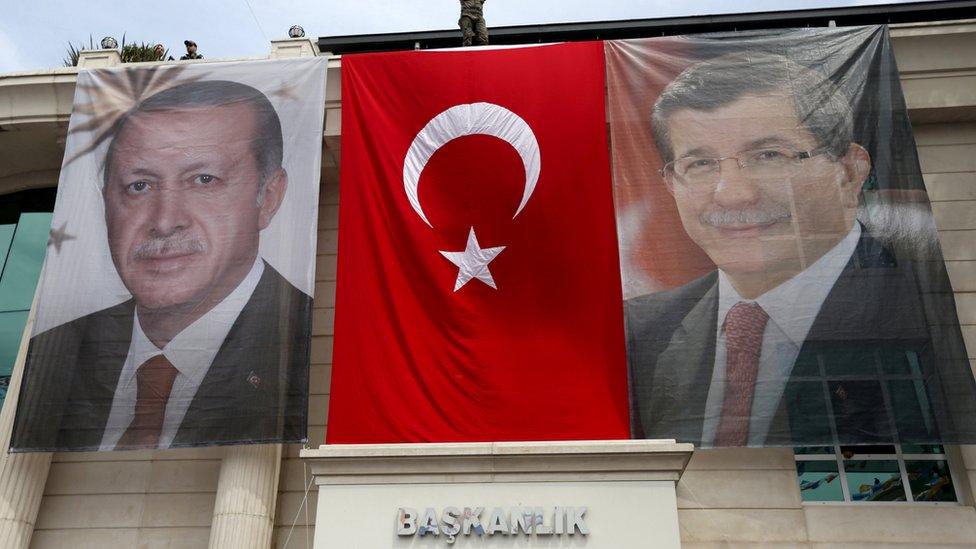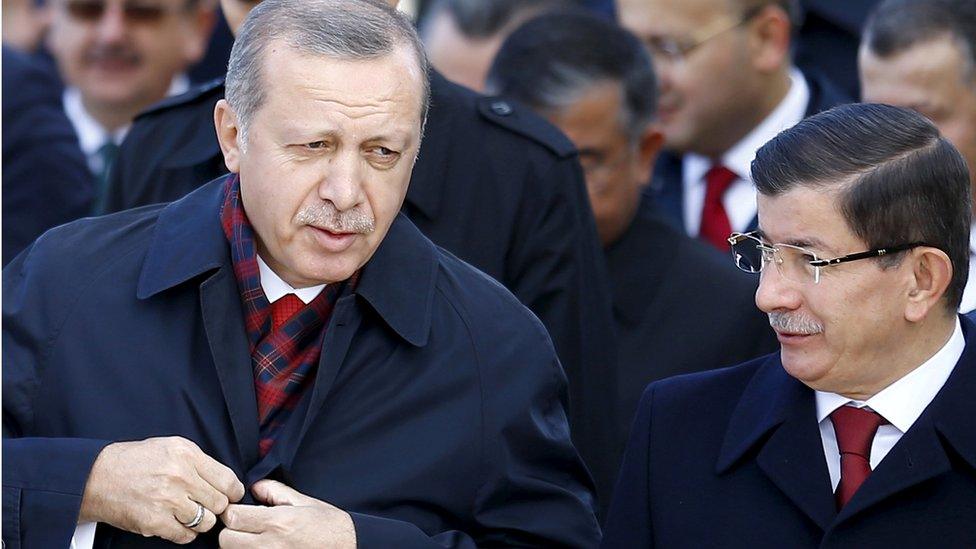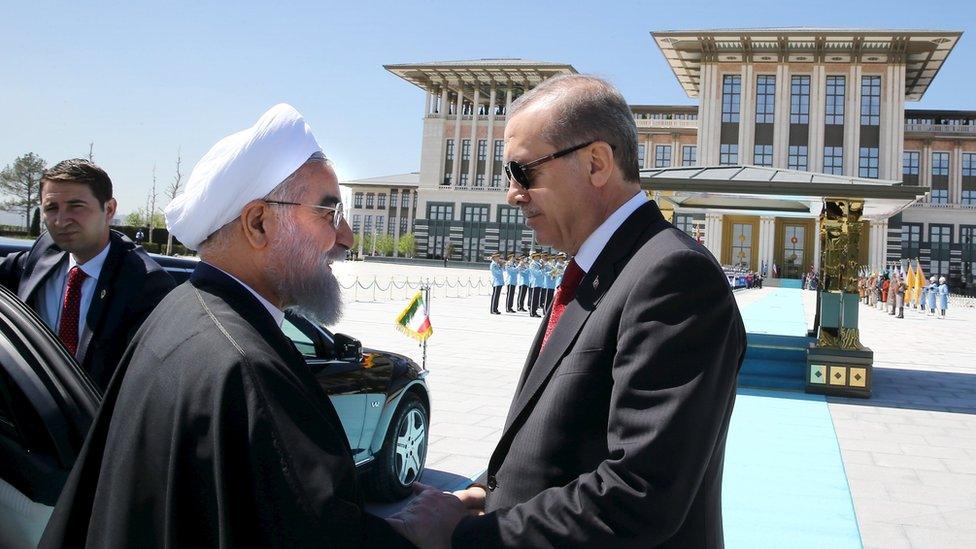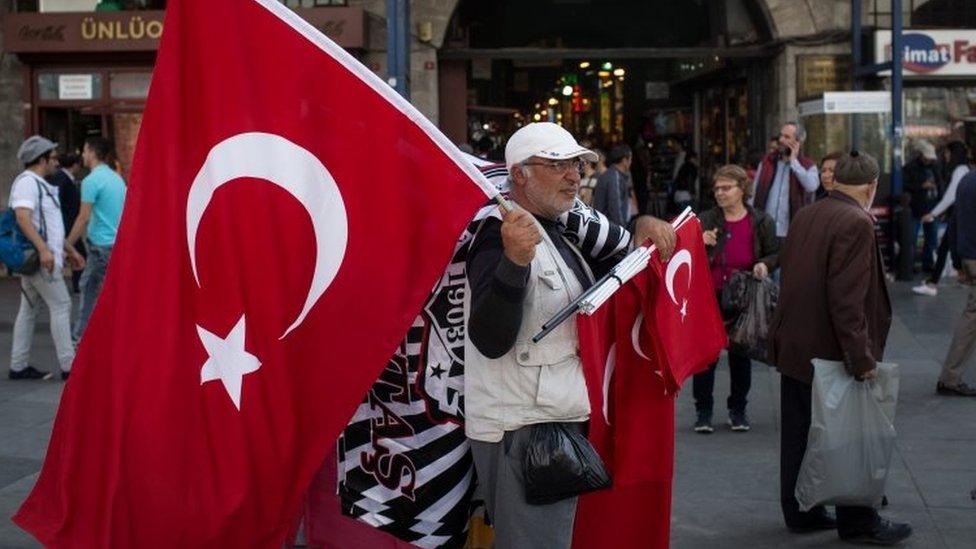Turkish leadership split spoils the party
- Published

Signs have grown of a rift between the president (L) and Prime Minister Davutoglu
Wednesday lunchtime, Brussels. The European Commission gives to Turkey what it's long coveted: a recommendation that Turkish nationals travelling to the EU's Schengen zone should no longer need visas.
It still has to pass the European Parliament and member states but is undoubtedly the biggest achievement for Turkey on its path to EU accession since gaining "candidate status" in 2005.
A moment to savour, you might think. But not, it appears, in Ankara.
In Turkey's capital, rather than celebrating a rare piece of good news, a sudden meeting was called between Turkish President Recep Tayyip Erdogan and Prime Minister Ahmet Davutoglu, amidst feverish talk of a split.
Turks look to EU to scrap visas for Europe travel
Erdogan - Turkey's bruised battler
Immediate political capital from the visa announcement has been squandered as headline writers turn instead to a fatal political falling-out. The timing could hardly have been worse - or more self-defeating.
After 90 minutes of talks, the news flash came: the governing AK Party (AKP) will hold a congress later this month. The prime minister is not expected to stand.
The dramatic events culminated on Thursday, when Mr Davutoglu confirmed he would not seek a new mandate.
So what is going on in the cigarette-filled corridors of Turkish power?
It boils down to one man - and his determined quest to change the constitution and enhance his position.

Mr Erdogan may have miscalculated if he saw Ahmet Davutoglu (R) as a pliant prime minister
Recep Tayyip Erdogan is arguably the most formidable politician since modern Turkey's founding father, Ataturk.
After 11 years as prime minister, he was elected president in 2014 - but under a parliamentary system, in which his role should be largely ceremonial.
The fiercely ambitious Mr Erdogan is intent on changing that to a presidential system, which he says would make Turkey function more effectively, but which would also significantly increase his powers.

Mr Erdogan (R) built a controversial 1,100-room palace, which he opened on becoming president
As president, he chose a prime minister who he thought would be pliant: the ex-foreign minister and bookish former academic, Ahmet Davutoglu.
But it seems he miscalculated.
Seeing wavering public support for a presidential system, realising that he would be significantly sidelined should it materialise, and disagreeing with Mr Erdogan on a growing list of policies, the prime minister has quietly dissented.
Until now, there was little public show of disobedience, no clear spat. That's not Mr Davutoglu's style. And perhaps he shied away from it, given the widespread fear of Mr Erdogan within the governing AKP.
But little by little the signs have grown:
The prime minister's unease over the president's clampdown on journalists and academics
Disagreement over MP candidates in the last election
His personal mission to clinch the EU visa deal by offering to readmit deported migrants, without discussing it with Mr Erdogan
And, most importantly for the president, an apparent lack of commitment to the presidential system
And so Mr Erdogan reacted. Last week, the AKP voted to strip Mr Davutoglu of the key power of appointing provincial party officials. It was, I am told, a clear move by Erdogan loyalists within the party's top brass to exert his control and give a warning sign to the prime minister.
Over the weekend, a mysterious blog appeared online, entitled "the Pelican Brief", written by someone who called himself "one of those who would sacrifice his soul for the CHIEF", meaning Mr Erdogan.
It talked of the "traitors" plotting against Turkey and named a new one, Ahmet Davutoglu. Speculation mounted that it was written by a pro-Erdogan journalist, probably with the blessing of the president's inner circle.
So Ahmet Davutoglu has, it seems, been hoisted by the presidential petard. And the sense it reinforces is of a president more powerful, and more hungry for power, than many had even thought.
Mr Erdogan is still hugely popular among his supporters, for the AKP is the house that Recep built: a party that gave a political voice to the pious side of the country ostracised for decades by the secularists; that revoked the ban on headscarves in public institutions, liberating millions of Turkish women; that built hospitals and schools and airports across the country, hugely expanding the middle class.
And the party owes him its multi-election-winning success.
Mounting dissent
But he's also presiding over a country in deep crisis: a renewed conflict raging with the Kurdish militant PKK; seven suicide bombs in a year blamed on the PKK and so-called Islamic State; double-digit unemployment; an expected tourism drop of about 40% this year; intense political polarisation; and freedom of expression plummeting as media outlets are taken over and journalists jailed.
So there is growing dissent within the AKP. But it is not tolerated.
Ahmet Davutoglu joins others whose concerns have led to them being sidelined or sacked, including President Erdogan's predecessor Abdullah Gul and former Deputy Prime Minister Bulent Arinc.
AKP members are under pressure to stress their loyalty, one MP from Konya tweeting this week: Turkey=RTE[Erdogan]=AK Party.
It's "us against them".
Amidst it all, the opposition is in disarray.
The pro-Kurdish HDP party faces potentially dozens of its MPs being imprisoned on supposed charges of supporting terrorism, a brawl erupting in parliament over the issue this week.
MPs had been meeting to discuss stripping politicians of parliamentary immunity when the fight broke out
The party leader warns it could provoke a backlash in Kurdish areas and even worse violence - and wreck chances of resolving the decades-long "Kurdish problem".
The secularist opposition CHP is so weak that it's unable to capitalise on the AKP's problems. And the far-right MHP is tearing itself apart with a potential leadership contest.
If it can install a new leader, probably the more centrist Meral Aksener, polls show it could double its votes and halt Mr Erdogan in his tracks. The AKP faithful are duly doing everything they can to stop it.
The road ahead
So how does this unhappy but crucial country stumble forward?
Ahmet Davutoglu has now announced plans to step down, presumably giving way to somebody more supportive of the president's plans.
Perhaps even Mr Erdogan's son-in-law, Energy Minister Berat Albayrak, might step up, his name among the favourites.
Should Mr Erdogan fail to persuade enough MPs to back a presidential system, he could force early elections in the autumn, hoping to push the HDP and MHP out of parliament, unless the latter changes leadership by then.
It may sound like internal party politicking. But these days are defining the political direction of the world's 17th-largest economy, Nato's second-largest army, an EU candidate, a crucial Western ally bordering Syria and Iraq and what was the pillar of stability in the Middle East.
The stakes are high.
- Published4 May 2016
